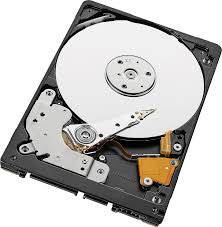This article introduces hard disk drive (HDD) which is one type of hard disk. You can learn about the advantages and disadvantages of HDD after reading this article.
Hard Disk drive can be classified to mechanical hard disk drive (HDD) and solid state drive (SSD). Traditional mechanical hard disk is also known as ordinary hard disk. It mainly consists of disc, magnetic head, disk rotor, control motor, head controller, data converters, data interface, cache, etc.

Head can move along the disk radius. And the disk can do thousands of high speed rotations in per minute. As a result, the magnetic head can do read and write operations in the positioned location on the platter. Changing the polarity electromagnetic flow of the magnetic head (closely to the magnetic surface) can complete the task of writing data on a disk. Information can be read by the opposite way. Dust is the enemy of hard disk (as precision equipment). So the air which enters into the hard disk must be filtered.
Theory
In mechanical hard disk, all the platters are installed in an axis, and one platter is parallel to others. There is a head on each disk storage surface. The distance between head and the disk is smaller than the diameter of a human hair. All magnetic heads are connected to a head controller, and the head controller is responsible for the movement of each head.
Distinguish
The advantages and disadvantages between HDD and SSD:
1. Shock resistance: HDD is disk type, and the data is stored in the disk sectors. As the SSD is made from flash particles (or storage medium like memory, MP3, U disk, etc.), there are no mechanical components in SSD. Thus even when high-speed movement with flipping and tilting happens, it will not affect the normal use of disk. And it can minimize the possibility of data loss when collisions and shocks. Compared with HDD, SSD has many advantages.
2. Read-write speed: An SSD-equipped PC can boot in just seconds but an HDD requires time to speed up the OS. Besides, an HDD is also slower than an SSD during normal use.
3. Consumption: consumption of SSD is lower than that of mechanical hard disk.
4. Weight: solid-state hard drive is lighter than the HDD. Compared to the conventional 1.8 inch hard disk, it is 20 to 30 grams lighter than the hard disk drive.
5. Noise: the solid state drive has no mechanical components and flash memory chips, so it owns the characteristics of small calorific value and fast heat dissipation, etc. Furthermore, there is no mechanical motor and fan in SSD, so the working noise value is 0 db. Mechanical hard disk is inferior to it.
6. Price: An SSD is more expensive than an HDD. For example, a 1TB internal 2.5-inch hard drive costs between $40 and $50, but an SSD with the same form factor and capacity costs $250 at least.
7. Capacity: the biggest capacity of solid-state drives is 4T (3.5 inches).
8. The service life: SLC can read and write for 100,000 times. And the low cost MLC can read and write for only 10000 times. So compared with solid-state drives, mechanical hard disk has a longer service time.
By contrast, in order to get fast read-write speed, many computer users choose SSD. Generally, to migrate OS from HDD to SSD is the common thing. How to do this work? MiniTool Partition Wizard, a piece of professional partition manager, enables you to perform OS migration with ease by its “Migrate OS to SSD/HD“.